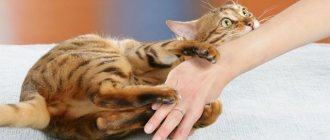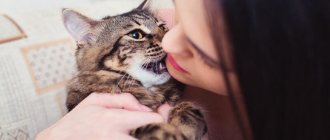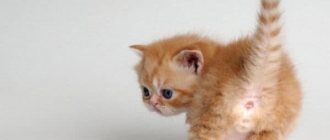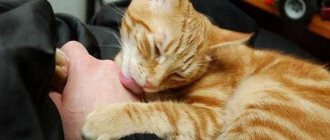Sometimes our cats do a little strange things that can leave us scratching our heads. One of those things is to sweetly lick your hands before you bite! What's up with this?
Some cats may bite you in a tiny, but painless way. Others bite to get an unforgettable experience, which is unpleasant. If your cat does the latter, it might be worth finding out more about why exactly they do it, and what you can do to stop them leaving teeth marks on your hand!
The cat is overly excited
Cats love to be petted, but sometimes a long petting session gets them over the edge. When this happens, our sweet and laid-back kitties may experience something called petting aggression.
It is thought to have something to do with the nerve endings connected to your cat's fur, and petting too often can cause discomfort. If your cat is gently licking you while you pet her and she suddenly bites you, this is probably the reason.
Image credit: congerdesign, Pixabay
Signs that a cat is overstimulated include widened eyes, folded ears, and tail flapping. Take the time to notice if your cat exhibits these signs when you pet her, and end the petting session before your cat reaches the point of overstimulation.
Some cats have areas of their fur that they can tolerate longer than others. By watching your cat's body language, you can make petting enjoyable for both of you.
How to wean yourself from a bad habit
Many owners of furry aggressors are trying to solve the question of why a cat bites just like that. Experienced breeders and animal psychologists believe that there is always a very specific reason behind aggressive behavior. By identifying the motive that prompts aggression, you can correct the behavior of your domestic cat. Experts recommend the following ways to get rid of a bad habit:
- Young kittens should be accustomed to the presence of humans as early as possible. Babies need to be held, stroked, caressed. Under no circumstances should you tease a kitten with your hands or use them as an object to play with. The baby should only play with teasers, toys and other devices.
- A visit to the veterinarian will help rule out disease as the reason why the cat bites.
- Under no circumstances should you punish a cat for bites inflicted during play. Any opposition will cause the pet to become even more aggressive. The best thing to do is to remove your hand and stop communicating with the cat for a while. The animal can also be distracted, for example, by offering to play with a toy.
- Instead of physical punishment, you can influence your pet psychologically: grab it by the scruff of the neck and hold it suspended for a few seconds. This will remind the aggressor of the lessons of the cat mother.
Patience, knowledge of your pet’s psychology and consistency in actions will help you wean yourself off the bad habit, and communication with your animal will be pleasant and safe.
The cat is looking after you
If you watch how your cat grooms itself, you will see that it sometimes alternates between licking its fur and biting its skin. While for some cats this may be a standard part of their grooming routine, for others it may be a sign of a skin infection or irritation from flea bites, so make sure you know what is normal for your cat.
Cats that chew regularly as part of their grooming routine do the same to their owners! Your cat may not realize that this could harm you!
If your cat gets into the habit of biting you after you've cleaned her, start by gently removing your hand before she approaches the bite. You can distract them with a toy or treat to signal that their grooming is over.
Never scold a cat for biting you; after all, they don't necessarily understand what they did wrong. Remember that mutual grooming (including biting!) is a bonding behavior in cats. By proposing to you, your cat is letting you know that he considers you part of his social group. By offering to lick and groom you, they are trying to strengthen the bond between the two of you - which is quite cute!
What does it mean if a cat first bites and then starts licking?
Experts give an unexpected answer to this question. It is believed that if an animal first bites and then licks a person, then it sees in him an equal to itself, and therefore treats it as it treats another cat. This is how cats show their behavior patterns.
There are cases when cats try to prove to their owner with their bite that they are sick or feel some kind of discomfort. Pets often lick damaged or diseased areas of their body. If a person touches this area, the animal may bite him.
Some cats, when licking their loved ones, themselves get great pleasure from this process. When an animal feels pain, it tries to hide it from strangers. Only an attentive owner will be able to notice that something wrong is happening to his pet. In case of the slightest suspicion, the animal must be shown to a veterinarian.
Stressed cat
Cats are sensitive creatures and sometimes they show stress by licking and biting. Some cats will groom themselves excessively, even pulling out fur. If your hand is near your cat, it may lick and then bite your hand.
Many things can cause stress in our cats, including moving to a new home, meeting a new pet, or being visited by strangers. If your cat is really nervous, talk to your veterinarian. Using a pheromone diffuser can also help calm your cat.
© shutterstock
Tags
Petya Koshkin Why a cat first How cats express Why a cat licks another cat. Cat bites demonstrate Why a cat Why a cat Why cats Why mine licks. Why cat Why cats Why cats purpose. Why is this so wrong? Why a cat Why do cats or cat characters and Caring cats play How cats become attached Hermitage cats play cats or cat characters and Caring cats How cats become attached Hermitage cats
affectionateattentionlickscatbreedcandogpetresponseprocessownerhelpsignshealth
The cat shows affection to you
It may not be your first choice, but small bites can be a sign of affection between cats. This is a normal behavioral interaction, especially between kittens. Some cats extend this same behavior to their owners!
If your cat is acting affectionate and then comes over to lick and bite, this is probably what is happening. Although there is no malicious intent behind it, sometimes you don't want to get bitten! In this case, pay attention to the cat's behavior before it approaches you and distract it before it gets to that point. You can still give and receive plenty of affection from your cat—just draw the line at love bites!
The Art of Hunting
Don’t let it come as a surprise to you when your pet begins to teach her offspring to hunt. At the beginning of classes it will look something like this: the mother cat firmly grabs the kitten with her front paws and beats on him with her hind paws. At the same time, she alternates between biting and licking him. In addition, it can purr loudly, encouraging it to learn.
1:2033
At the initial stage of training in the art of hunting, the cat demonstrates with its kittens how to properly capture and subdue the prey. In addition, the ability to suppress will be needed by the young when they grow up and begin to defend their rights to territory and dominance. And believe me, in a couple of weeks you will already be watching kids practicing these techniques on each other.
Read also: Why does a camel need two humps?
1:666
2:1170
When the litter grows a little more and begins to crawl out of the shelter, a slightly different picture will open before you. In addition to the training activities described above, demonstration hunting jumps and pursuit will be added. Mommy, by personal example, will show the children how to sneak, wait and suddenly jump on the victim. Everything will remain the same with the squeak: if you meow, you understand. As before, the young animals will continue to practice the techniques both among themselves and on the mother.
Read also: Does TSUM sell counterfeits? Expensive
2:1993
Summarizing
Cats don't lick or bite without reason, so if your cat seems to behave this way regularly, then it's worth taking the time to find out why. If you think it's just affection or play, then you can either let them continue (if you don't mind getting your hand pinched) or find ways to distract your cat before she bites you.
If you think your cat's biting behavior is due to overstimulation, then it is important to make it clear to everyone in the house that petting should be kept short and to watch for signs of overstimulation in your cat. Petting-induced aggression is not your cat's fault; it is simply an automatic reaction to an unpleasant feeling. By paying attention to our cat's body language, we can ensure that we don't make her feel uncomfortable.
If you think your cat's biting behavior is related to stress, it is important to talk to your veterinarian and ask for advice on how to minimize it. Prolonged stress is harmful to cats and can lead to health problems.
If your cat ever licks and then bites you, do you understand why? What did you do to stop them? We'd love to hear from you!
Posted by Emma Stenhouse Emma is a freelance writer specializing in pets, outdoor activities and the environment. Originally from the UK, she lived in Costa Rica and New Zealand before moving to a small holding in Spain with her husband, their 4-year-old daughter and their dogs, cats, horses and birds.
Additional recommendations
You can establish a relationship with a cat by taking into account its psychology, instincts and observing the pet’s behavior. Good results will be achieved by following these simple recommendations:
- Observing the cat's reactions when showing affection. If the cat is tense and wary, then you should let her go and give her some privacy.
- Determining the time limit. Using the test method, you can determine when the animal responds well to stroking and when it begins to get nervous.
- Treat. You can simply accustom an animal to hands and displays of affection by offering him his favorite treat after such close communication.
- Determining places for stroking. By experimenting, you can determine in which places the animal reacts kindly and peacefully to stroking, and which areas of its body are better not to touch. This is a purely individual question.
Why does an animal bite and scratch?
Another way to convey your emotions and desires is to bite and scratch. This behavior is not always explainable to a person, and sometimes it seems to him that the cat bites for no reason, just like that.
But this is not so, such behavior always has a reason:
- It is not uncommon for an owner to give his pet a good beating for stealing a piece of sausage from the table: teach him a lesson with a broom or slipper, spank him with a towel, or throw him out into the street with a kick in the tail in the bitter cold of winter. Because, having received what he deserved, the cat will remember and will no longer misbehave. The cat will really remember and……. will take revenge. Therefore, when the owner has forgiven his fluffy cat and again tries to bestow affection on him, he may remember the offense;
- Sometimes the cat really wants to do something, but the owner doesn’t allow it. And then he shows stubbornness, biting and scratching;
- A kitten, like a child, can bite when it is teething;
- Cats often bite their kittens to show them their love. Such bites are weak and painless. If a cat slightly bites your hands, it is showing its love;
- Cats are predators by nature, but in a cozy human home there is always food, water and a warm sofa. Only the instincts still make themselves felt, and the energy requires an outlet. And then the cat plays, runs after a ray of sunlight and bites;
- During illness, a cat, like a person, can hardly enjoy any kind of affection; he just wants peace and relaxation.
The cat wants to rest
Cats love to play with their people and it's a great way to bond. However, they also have mood swings, and if you become overly persistent in playing and petting your pet, she will feel uncomfortable. Overstimulation occurs when a sensitive part of the body is touched accidentally and repeatedly. Your pet may lick and then gently bite you to show that he wants to take a break.
Why are cat bites dangerous?
Research has shown that after cat bites, one in three people attacked requires hospitalization.
Why is such an act so threatening that it could land the victim in the hospital? Not at all because of bacteria in saliva. Their teeth are to blame for much of the damage caused by these rodents. Dog teeth are relatively blunt and wide, and do not penetrate so deeply into the tissue. Cat incisors are sharp, like saws, and easily drive to great depths, moving saliva bacteria, streptococci and staphylococci from human skin to the center of the wound.
As bacteria spreads in the wound, the pain becomes stronger and stronger, swelling may appear around the damaged area, and the infection spreads along with the blood. Therefore, act quickly:
- First, don't block the blood. Allow it to flow spontaneously from the wound for a while, clearing it of germs.
- Secondly, wash the bitten area with soap and water and disinfect it with hydrogen peroxide or antiseptics.
- Third, apply antibiotic ointment.
- Fourth, put on a bandage.
All this can and should be done immediately after the incident. Then it is best to contact your doctor directly. If you are unable to do this, monitor your condition for fever, swelling, or throbbing severe pain, not necessarily limited only to the wound site. If you notice alarming symptoms, be sure to visit the hospital.
There are many methods that can be used to eliminate bad habits in a cat. But before that, you need to find out why he bites. The reason may be in the owner himself, in his behavior. Negative factors must be completely eliminated for the animal’s behavior to return to normal. Then it will purr and not bite. If you do this at a young age, there should be no problems with the cat later.











